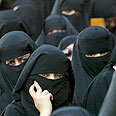
Welcome home: Iranian women
Photo: Reuters
TEHRAN – I stood behind a long line of girls, waiting to board Air France flight 39, nonstop Paris-to-Tehran. I, an Israeli reporter, going to cover an election in the country Prime Minister Ariel Sharon has called Israel’s “the number one threat.”
Really changing?
By Orly Azoulay, Yedioth Ahronoth
Nameth Ahmadi, advisor to Iranian presidential candidate Ali Ahbar Rafsanjani, says his candidate could move to renew ties with Israel
Here in Paris, the Iranians wore trendy jeans and make up, chirped happily on their cell phones with friends about last night’s adventures in the city’s pubs, and various shades of dyed blonde hair draped open over their shoulders.
As we prepared to land, the story flipped. One-by-one, the young women went to the bathroom with a plastic bag and came back ready for life in the Islamic Republic - covered head-to-toe, long-faced, and eyes sullen. The laughs they shared as they boarded the plane turned to heavy silence. As they handed their passports to the immigration officer, they looked as if they’d returned to jail.
My official government escort wasn’t surprised. “This is Iran,” she said. “Everyone here lives a double life.”
No Hebrew, Yiddish
I’d arranged my visit to Tehran through an acquaintance living in France, Dr. Manoushar Gangi, a former education minister in the Shah’s government who escaped to Paris when the late Ayatollah Khomeini issued an order for his execution.
“Forget it, Orly,” he said when I told him I’d unexpectedly been granted an entry visa. “They’re setting a trap for you.”
Once I made it clear I’d be going despite the warning, Gangi could only give me advice.
“Whatever you do, don’t take a taxi from your hotel. All the drivers that work the hotels are government agents and spies. If you want to take a taxi, walk a few blocks, hail a taxi there. Take it for 10 minutes, get out, and find a second one. Then you can go where you want.
“Be aware, as soon as you walk into a hotel you are being watched. They are listening to your phone calls, they are listening to your conversations in he lobby. If you have an important interview, take the subject to a park. Don’t talk in the hotel. And don’t, under any circumstances, let them hear you speak Hebrew or Yiddish.”
The advice turned out to be more valuable than gold. I got to know all the areas parks and became an expert in changing taxis. The knowledge allowed me to get away from my grey-suited government tail who followed me like a shadow.
Red carpet
For the trip, my partner stayed in Washington, and we arranged special codes for our phone calls. For instance, if I told him I’d bought a red carpet, it meant I was in trouble, and he should try to get me out immediately.
It almost happened. The day after I arrived a bomb went off in downtown Tehran, killing four. That night, an information ministry spokesman arrived at my hotel, telling foreign reporters the blast was perpetrated by the CIA and Israeli agents in order to create havoc in Iran. I had visited the square where the bomb exploded the night before.
I locked myself in my room, and made plans to call my partner to tell him about the “red carpet” if I heard a knock at the door. It never came.
Different Iran
Most of the people I met knew who I was but didn’t talk about it. They led me to believe I was protected. It was important to them to show me a different Iran: a country that wants to rejoin the family of nations and rid itself of its image as the cradle of international terrorism.















